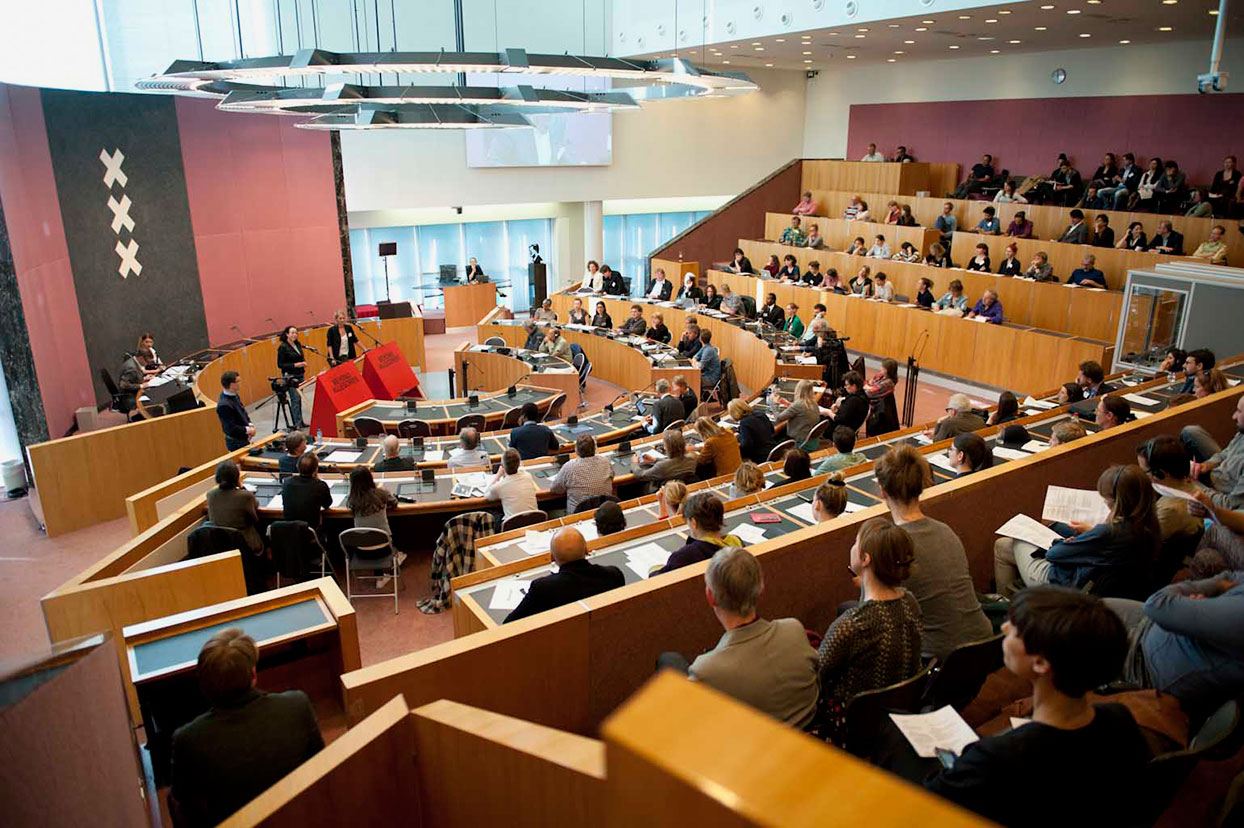Plea for a Free Zone
August 19, 2014column,
The following text was developed on the occasion of the Beyond Allegories debate, for which 250 artists, politicians, union representatives, university professors, dramatists, representatives from refugee organisations and NGOs, journalists, and students gathered together for seven hours in Amsterdam’s City Council to discuss the role of art within governance, political mobilisation and action. This debate was organised by Ann Demeester (De Hallen | Frans Hals Museum), Carolien Gehrels (until recently Alderman for Art & Culture, PvdA / Labor Party Amsterdam) and the artists Hans van Houwelingen and Jonas Staal in an effort to forge new progressive alliances. The text will be part of the DVD-book Beyond Allegories, a collection of the resolutions and videos that resulted from the project, which will be published this year.

We, Salima Belhaj (party leader for D66, Rotterdam) and theatre collective Wunderbaum (Walter Bart, Wine Dierickx, Matijs Jansen, Maartje Remmers and Marleen Scholten), join in the following pleas:
1. The Introduction of Free Zones
The democratic project as a public project has been suffering from growing regulation mania for several decades, turning a free society into a risk-free society. Consequentially, money and focus is increasingly placed on prevention: starting with preventive frisking, camera surveillance and ethnic registration, and transgressing to spying on civilians. With this shift towards risk prevention the core of freedom and democracy has eroded. Democracy, after all, always possesses an element of danger. It is precisely in this element of danger where the possibility of change is located, the possibility of democratic innovation. Everybody has the right to democratic representation. What is more, everybody has the right to plea for the abolishment of democracy as such. This is the experimental and conflictual core of democracy. The plea for Free Zones attempts to reestablish this “space of experimentation” as the core of democracy: democracy as a space where authority does not interfere, unless something goes wrong. In a democracy power is in essence located with the people. The Free Zone celebrates this principle of public democracy.
2. Art as a Free Zone
The New Forest is a multi-year project of theatre collective Wunderbaum that studies and represents social changes and transitions in our current society, in collaboration with civil society organisations and communities in and around Rotterdam. The New Forest represents a future world through performances, seminars, context (live and online) and an interdisciplinary film project. Taking Willem Schinkel’s book De nieuwe democratie [New Democracy] (2012) as a starting point, the recurring goal of The New Forest is the exploration of new models of democracy.
The New Forest was temporarily based on top of the old train station in the north of Rotterdam, where it manifested itself as a public parliament: a political space where the question of democratic representation was once again the central focus and was discussed by people from all layers of society.
What are the boundaries of democracy and can these boundaries exist at all when democracy is about representing the public as a whole? The public parliament is a Free Zone par excellence as it allows the possibility of collective debate and the shaping of the concept of “the people”. The essence of this proposition is that democracy can only exist within the permanent questioning of what democracy really is. As such, The New Forest is a case for the Free Zone: a questioning of democracy as the heart of democracy.
All other video registrations of Beyond Allegories including the Introduction and Epilogue can be found on this page: www.vimeo.com.
Essay by E. C. Feiss, On Beyond Allegories
Ann Demeester, Carolien Gehrels, Hans van Houwelingen, Jonas Staal, Beyond Allegories
Mariko Peters, Metahaven & Jonas Staal, Towards an Extra-Parliamentary Democracy!
Yoonis Osman Nuur & Ahmet Öğüt, Political Representation Beyond Citizenship
Dirk Poot & Foundland, Mapping the Deep State
Carolien Gehrels & Hans van Houwelingen, The Creative City: A Blessing for Administration but a Curse for the Arts
Ron Meyer & Matthijs de Bruijne, De Democratisering van de Kunst
Ron Meyer & Matthijs de Bruijne, Democratising the Arts
Salima Belhaj is a council member of Rotterdam since 2008 and since 2010 she is party leader of D66 (Democrats 66) in that city. As such she takes an active role in the debate on racism and the debate on culture. In 2011 she participated in the first edition of the project Allegories of Good and Bad Government in W139, Amsterdam. In 2014 she had a decisive role in the coalition debates that led to the formation of the local government of the city of Rotterdam consisting of members of the political parties D66, Leefbaar Rotterdam [Livable Rotterdam] and the Christen-Democratisch Appèl (CDA, Christian Democratic Appeal).
Maartje Remmers is a Dutch actress and member of the Flemish-Dutch theater collective Wunderbaum consisting of herself, Walter Bart, Wine Dierickx, Matijs Jansen, Maarten van Otterdijk and Marleen Scholte. In 2013 Wunderbaum initiated the four-year project The New Forest in which Wunderbaum explores together with civil society organizations alternative models of democracy through theater. See further: www.thenewforest.nl.